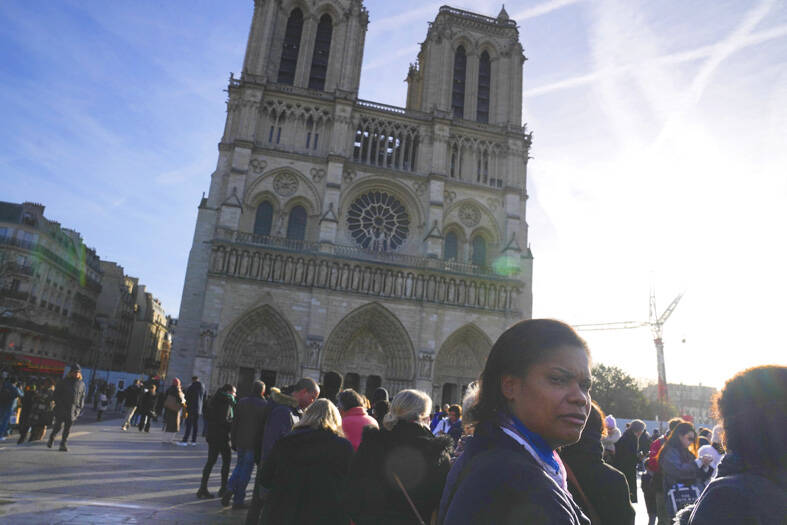Holidaymakers are returning to Paris for winter holiday magic as the tourism industry rebounds, inspired by the successful Olympic Games and the reopening of Notre-Dame cathedral.
“This year there is much more tourism than last time I came here. Much, much more. Many more people,” said Noemi Rizzato, a tourist from Milan who braved the cold to visit the Place du Trocadero, bundled up in her down jacket.
Georges Bardot, a 78-year-old pensioner from eastern France, also pointed to large numbers of foreign tourists amid the holiday hustle and bustle in the City of Light.

Photo: AP
“We heard every language except French spoken on the Metro,” Bardot laughed.
This winter, Parisian hotels are experiencing a surge in demand.
The booking rate for two-week Christmas vacations neared 70 percent in the middle of this month, nine percentage points higher than a year ago, data from MKG Consulting showed.
Top-of-the-range establishments are doing particularly well, with an increase of about 14 points over one year.
Well-heeled international customers are making a comeback, the UMIH hotel and restaurant union said.
UMIH president for the Paris region Frank Delvau pointed to an “Olympic effect.”
The Games “have made tourists want to come back, or to visit,” he said.
Tourism professionals said the world’s largest sporting event led to a lackluster summer in Paris.
Wealthy Parisians fled the capital for the summer and many foreign holidaymakers chose to stay away due to transport gridlock and a security crackdown. Hotels and airlines such as Air France saw a drop in bookings, while taxi drivers and restaurant owners said their businesses had been badly affected.
With 5 billion viewers, the Paris Games were the most followed Games in television and social media history, according to the International Olympic Committee.
“We needed this catch-up effect, because the situation was very difficult in the third quarter,” Delvau said.
“There was a very sharp fall in visitor numbers. The restaurant business was down 40 percent, 50 percent at times,” he added.
From Nov. 1 to Dec. 8, international air arrivals to Paris rose by 15.4 percent compared with last year, to reach 1.3 million, the Paris Tourist Office said.
On the Ile de la Cite, the island site of Notre-Dame cathedral, shopkeepers eagerly await the return of visitors after five years of reconstruction work, as well as the COVID-19 lockdowns that saw a drop in tourist numbers.
“The Notre-Dame opening this year was the biggest item on our list,” said Teju Arora, an engineer from the US.
“And we did visit Notre-Dame, it was amazing. It’s a beautiful site and it was great to see, to pray, to visit,” said Arora, wearing a red beret.
About 270,000 people have visited the medieval masterpiece in the first eight days since Notre-Dame reopened in early this month, rector Olivier Ribadeau Dumas told French daily Le Parisien.
“Around 30,000 people a day enter the cathedral,” Dumas said.
Tourists “tell themselves it’s time to go to Paris,” Delvau said. “They have both Notre-Dame and the department stores’ windows, which always attract a lot of people.”

In Italy’s storied gold-making hubs, jewelers are reworking their designs to trim gold content as they race to blunt the effect of record prices and appeal to shoppers watching their budgets. Gold prices hit a record high on Thursday, surging near US$5,600 an ounce, more than double a year ago as geopolitical concerns and jitters over trade pushed investors toward the safe-haven asset. The rally is putting undue pressure on small artisans as they face mounting demands from customers, including international brands, to produce cheaper items, from signature pieces to wedding rings, according to interviews with four independent jewelers in Italy’s main

Japanese Prime Minister Sanae Takaichi has talked up the benefits of a weaker yen in a campaign speech, adopting a tone at odds with her finance ministry, which has refused to rule out any options to counter excessive foreign exchange volatility. Takaichi later softened her stance, saying she did not have a preference for the yen’s direction. “People say the weak yen is bad right now, but for export industries, it’s a major opportunity,” Takaichi said on Saturday at a rally for Liberal Democratic Party candidate Daishiro Yamagiwa in Kanagawa Prefecture ahead of a snap election on Sunday. “Whether it’s selling food or

CONCERNS: Tech companies investing in AI businesses that purchase their products have raised questions among investors that they are artificially propping up demand Nvidia Corp chief executive officer Jensen Huang (黃仁勳) on Saturday said that the company would be participating in OpenAI’s latest funding round, describing it as potentially “the largest investment we’ve ever made.” “We will invest a great deal of money,” Huang told reporters while visiting Taipei. “I believe in OpenAI. The work that they do is incredible. They’re one of the most consequential companies of our time.” Huang did not say exactly how much Nvidia might contribute, but described the investment as “huge.” “Let Sam announce how much he’s going to raise — it’s for him to decide,” Huang said, referring to OpenAI

The global server market is expected to grow 12.8 percent annually this year, with artificial intelligence (AI) servers projected to account for 16.5 percent, driven by continued investment in AI infrastructure by major cloud service providers (CSPs), market researcher TrendForce Corp (集邦科技) said yesterday. Global AI server shipments this year are expected to increase 28 percent year-on-year to more than 2.7 million units, driven by sustained demand from CSPs and government sovereign cloud projects, TrendForce analyst Frank Kung (龔明德) told the Taipei Times. Demand for GPU-based AI servers, including Nvidia Corp’s GB and Vera Rubin rack systems, is expected to remain high,